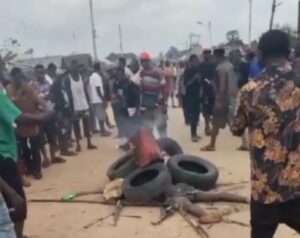Former Chinese leader Jiang Zemin died Wednesday at the age of 96, state media reported, hailing him as a great communist revolutionary who helped quell the 1989 pro-democracy protests.
Jiang took power in the aftermath of the Tiananmen Square crackdown, in which the military used deadly force to end peaceful demonstrations, and led China towards its emergence as a global economic powerhouse.
The major bodies of China’s ruling Communist Party announced his death through a letter that expressed “profound grief”.
“Jiang Zemin passed away due to leukemia and multiple organ failure in Shanghai at 12:13 pm on Nov. 30, 2022, at the age of 96, it was announced on Wednesday,” news agency Xinhua said.
His death came after all medical treatments had failed, it added, citing the letter.
“Comrade Jiang Zemin was an outstanding leader… a great Marxist, a great proletarian revolutionary, statesman, military strategist and diplomat, a long-tested communist fighter, and an outstanding leader of the great cause of socialism with Chinese characteristics,” it said.
Jiang’s death comes as China sees a flare-up of anti-Covid lockdown protests that have morphed into calls for more political freedoms — the most widespread since the 1989 pro-democracy rallies.
“During the serious political turmoil in China in the spring and summer of 1989, Comrade Jiang Zemin supported and implemented the correct decision of the Party Central Committee to oppose unrest, defend the socialist state power and safeguard the fundamental interests of the people,” state broadcaster CCTV said Wednesday.
When Jiang replaced Deng Xiaoping as leader in 1989, China was still in the early stages of economic modernisation.
By the time he retired as president in 2003, China was a member of the World Trade Organization, Beijing had secured the 2008 Olympics, and the country was well on its way to superpower status.
Analysts say Jiang and his “Shanghai Gang” faction continued to exert influence over communist politics long after he left the top job, including in the selection of Xi Jinping as leader in 2012.
Concerns over Jiang’s health had been raised when he did not attend the opening or closing ceremonies of last month’s Communist Party Congress, at which Xi was granted a historic third term.
CCTV said flags would be flown at half-mast at Chinese government buildings until the funeral, the date of which was not announced.
State media websites turned black-and-white, and they posted a black-and-white photo of a chrysanthemum on their official accounts on social media platform Weibo.
Russian President Vladimir Putin was one of the first world leaders to pay tribute, saying Jiang had been “a dear friend of our country”.
“The bright memory of such an authoritative politician and a wonderful person will forever remain in my heart,” Putin said in a message of condolence.
UN Secretary General Antonio Guterres called Jiang a “steadfast advocate for international engagement” and said his tenure coincided with “substantial economic progress.”
Jiang exuded “personal warmth and openness,” he added.
State media said he had died just after 12:00 local time (04:00 GMT), in Shanghai, on Wednesday.
Jiang presided over a time when China opened up on a vast scale and saw high-speed growth.
His death comes as China sees some of its most serious protests since Tiananmen, with many demonstrating against Covid restrictions.
A Chinese Communist Party statement said he died of leukaemia and multiple organ failure.
It added that he was recognised “as an outstanding leader with high prestige” and “a long-tested Communist fighter”.
He was also keen to ensure that his position within the Communist Party was secure, and came up with his own political ideology – the Three Represents theory – in an attempt to modernise the party.
During his time in power, Jiang sought to strengthen ties with the US, visiting the country several times and offering then-president George W Bush co-operation in Washington’s “war on terror” following the 9/11 attacks.
In a country not known for its flamboyant leaders, he was seen as having a more colourful personality than his successors. He memorably crooned Elvis Presley at a global summit, and went for a swim off the Hawaiian coast.
In his later years he withdrew from government and was rarely seen in public. But even as he became less conspicuous, online he became an unlikely subject of viral internet memes.
Many Chinese affectionately caricaturised his signature large spectacles, and likened his appearance to a toad. Young fans called themselves “toad worshippers”.
Discover more from KossyDerrickent
Subscribe to get the latest posts sent to your email.








